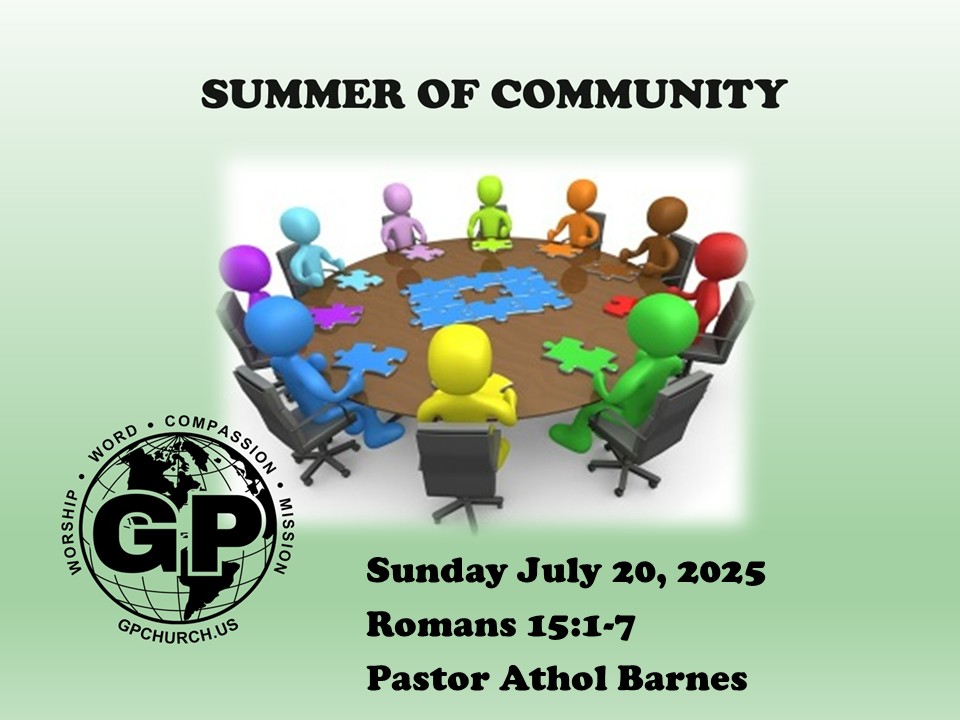
We live in an era when we are more connected than any other time in the history of man.
But psychologists tell us that loneliness is the number one health issue of our time. How can it be that we are so connected but at the same time so lonely?
In Acts 2:42, we read that the early church devoted themselves to fellowship. The Greek word “Koinonia” means partnership, participation, communion, and companionship.
In Romans 15:1-7, the Apostle Paul instructs the Roman church how to live and relate to one another in light of the Gospel.
The Gospel Leads to Unity
In the first verse Paul gets straight to the point, “We who are strong have an obligation to bear with the failings of the weak, and not to please ourselves.” He uses the word obligation, which could also mean duty, or legal requirement.
We don’t like this kind of language in our culture today; we are free individuals, so why should we be obligated to do anything for someone else? This issue existed in the first-century church as well. Paul answers the question very clearly in verse 3 of Romans 15, “For Christ did not please himself, but as it is written, “The reproaches of those who reproached you fell on me.””
Christ gave himself for us. This is the foundation for the Gospel message: Jesus, being obedient to the Father, preferred us over his own life and his position in heaven. True unity in the church is an outworking of the Gospel; it is a miracle as the Holy Spirit draws us to prefer each other in light of what Jesus has done for us.
Endurance and Encouragement Leads to Unity
Though unity among believers is an outflow of the gospel, it still takes work. Paul repeats the phrase “endurance and encouragement” in verse 4. Being devoted to the fellowship of believers, as the early church was, takes endurance, hard work, and commitment.
Endurance is the ability to persevere in doing something even when it is difficult or when the finish line never seems to get any closer. Walking in unity requires endurance; there are days when it seems easier than others, but we keep on going because we are committed to each other just as Christ is committed to us.
Along with endurance, we need encouragement. We are encouraged by the faithfulness of those who have gone before us (see Hebrews 12:1). We are encouraged by the Word of God, and by the presence of the Holy Spirit in our lives and in the church.
All of these encourage us and keep us moving forward towards greater unity, towards a healthier community.
The Purpose of Unity
Community literally means living with unity. But what is the purpose of unity in the church?
Is it so that we can just get along or portray the image of a nice happy family? Is it so that we attract more people to our happy community and grow? Actually, unity is significantly more important than all those outcomes; unity in the church is to bring glory to God (see Romans 15:6).
How do we display the glory of God as the church? In Ephesians 3:10 we read, “so that through the church the manifold wisdom of God might now be made known to the rulers and authorities in the heavenly places.”
God is using the followers of Jesus to display His wisdom to the rulers and authorities in the heavenly places. The word for “manifold” is the same word that one would use to describe the many facets of a diamond. God holds the church up like a diamond and points to the church, teaching the angels and principalities of the spirit world about Himself.
Even as we are weak, broken, and struggling towards unity, we are used by God more than we will ever know because of the Gospel and the righteousness of Jesus. When we walk in unity and prefer others over ourselves, we display the glory of God. In John 17:22 and 23, Jesus prayed that we would display the glory given to him by the Father in order to draw others to a saving knowledge of himself.
The Miracle of Unity
Unity is not simply getting along for the sake of peace; unity is a miracle of God displaying the glory of God to a lost and dying world. Jesus went to the cross so that we could be a community of believers united in fellowship and love.
There is much at stake, including the eternal destiny of our neighbors. It is vital that we are a healthy community.. Our culture is starving for authentic community, and we have the solution to show it to them—the power of the gospel, the encouragement of the Word and of those who have gone before us, and the example of our Savior.
The Path to Unity in Community
Many people are thirsting for community but are afraid to step into it. Building authentic community can be scary as it requires vulnerability, self-sacrifice, and laying aside our fears of rejection. But something powerful happens when we reach out and proactively strive to build community, not for what we can get out of it but for the Glory of God to be displayed. When the focus is off of ourselves, we will get more out of a community than we ever imagined, and we will be healthy.
When we grasp that Jesus went to the cross for us, we will easily give ourselves and our self-interests away in order to step into a community where Jesus is glorified. If we struggle to stay in fellowship with each other, it is because we are not allowing the Gospel message to permeate our relationships; we are self-centered rather than grace centered.
We live in a culture of individualism and consumerism, and the church can easily fall into the trap of feeding the desires of the consumers instead of focusing on the glory of God. A healthy church is where people willingly step into community to display the glory of Jesus.
Stepping into Community Begins with the Gospel
Firstly, we need to understand that supernatural unity can only be found in a personal relationship with Jesus Christ as the head of the church. A church community that is not centered around a common relationship with Jesus will always leave us wanting (see John 4:13-14a).
Stepping into Community Requires Vulnerability
Stepping into community requires vulnerability and involves risk. We are all busy, but we prioritize what we value. What might happen if you volunteered to serve, hosted a meal, or invited others into your life and home?
What if we prioritized and valued authentic community—what better way to spend our time than to display the glory of God?
Are you ready to take a step into community today?









